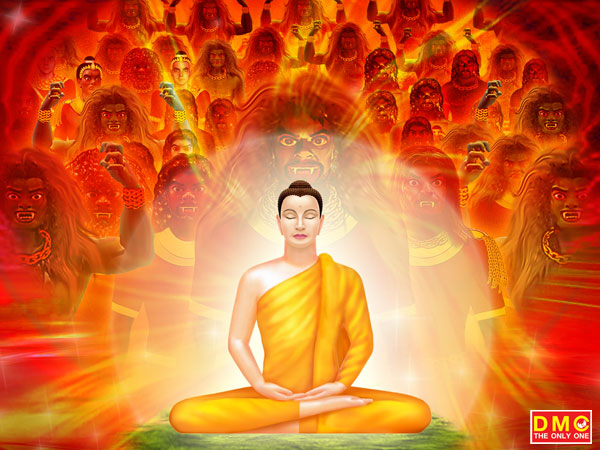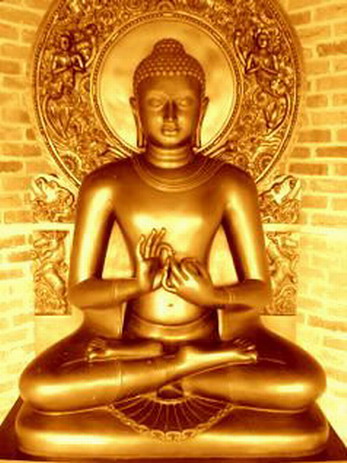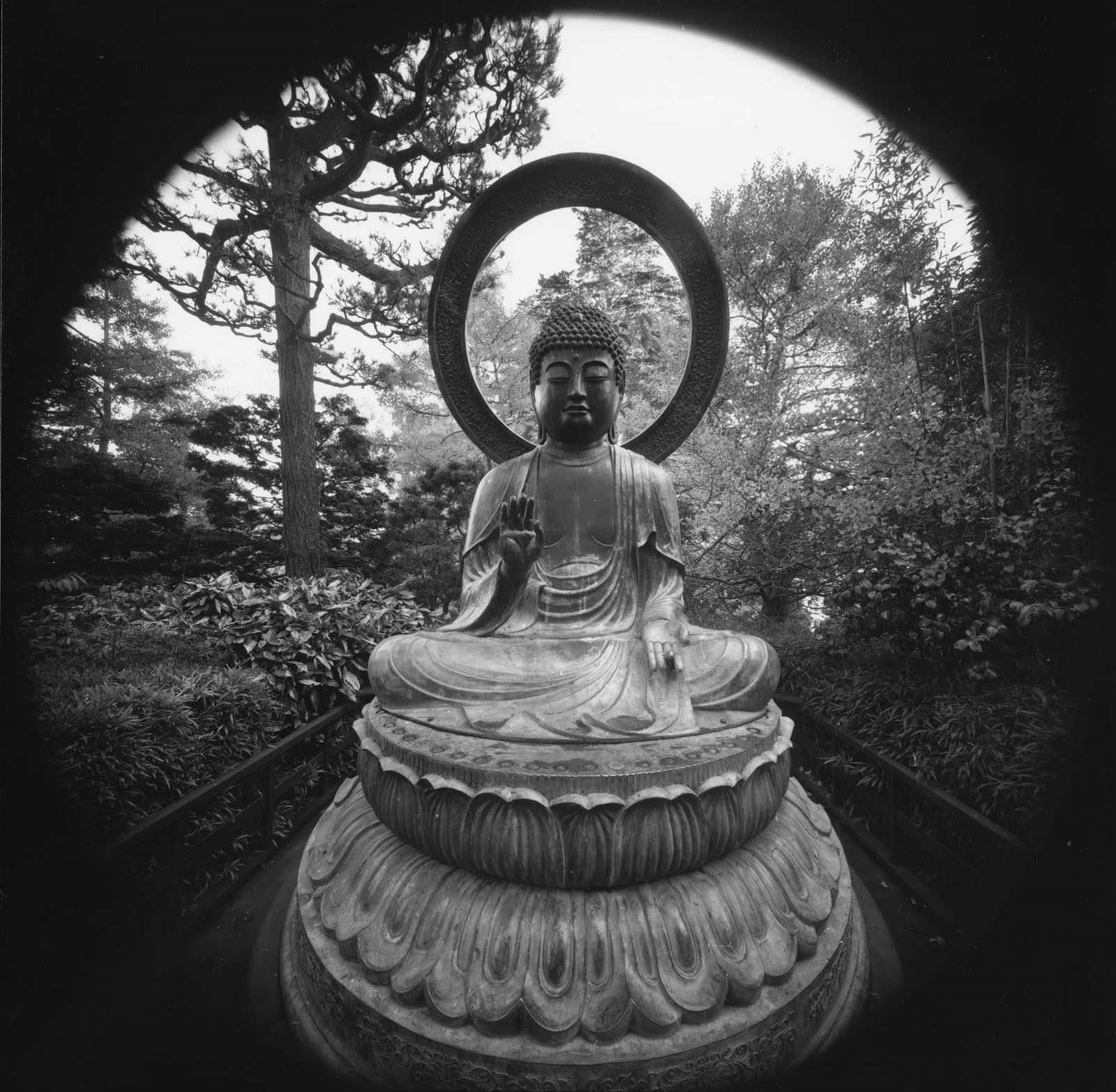Tuesday, October 25, 2011
Tuesday, September 27, 2011
Gautama Buddha History
Siddhartha Gautama was born about 583 BCE, in or near what is now Nepal. His father, King Suddhodana, was leader of a large clan called the Shakya. His mother, Queen Maya, died shortly after his birth When Prince Siddhartha was a few days old, a holy man prophesied the Prince would be either a great military conqueror or
a great spiritual teacher. King Suddhodana preferred the first outcome and prepared his son accordingly. He raised the boy in great luxury and shielded him from knowledge of religion and human suffering. The Prince reached the age of 29 with little experience of the world outside the walls of his opulent palaces.
One day, overcome with curiosity, Prince Siddhartha asked a charioteer to take him on a series of rides through the countryside. On these journeys he was shocked by the sight of an aged man, then a sick man, and then a corpse. The stark realities of old age, disease, and death seized and sickened the Prince.
Finally, he saw a wandering ascetic. The charioteer explained that the ascetic was one who had renounced the world and sought release from fear of death and suffering.
The Queen died shortly after his birth and the Queen's younger sister, Maha Pajapati Gotami, who was also married to the King, adopted the child while entrusting her own son, Nanda, to the care of the nurses.
One night, Queen Mayadevi dreamed that a white elephant descended from heaven and entered her womb. The white elephant entering her womb indicated that on that very night she had conceived a child who was a pure and powerful being. The elephant's descending from heaven indicated that her child came from Tushita heaven, the Pure Land of Buddha Maitreya. Later, when she gave birth to the child, instead of experiencing pain the queen experienced a special, pure vision in which she stood holding the branch of a tree with her right hand while the gods Brahma and Indra took the child painlessly from her side. They then proceeded to honor the infant by offering him ritual ablutions.
On the fifth day after the prince's birth he was named Siddhattha which means "wish fulfilled". His family name was Gotama. His Father invited a brahmin to make predictions about the prince's future. The brahim prophecied that Siddhartha will get disillusioned with the material world and would venture out as a sage in search of wisdom to overcome suffering and misery from the world. Fearing that the prophecy might come true, King Suddhodana brought up his son in immence luxury ans a world devoid of sorrow, thinking that this divert Gautam's mind from misery and sorrow.
As a Prince, Siddharta received royal education. He also received special training in the art of warfare. At the early age of sixteen, he married his beautiful cousin of equal age, Princess Yasodhara. For nearly thirteen years, after his happy marriage, he led a luxurious life, blissfully ignorant of the vicissitudes of life outside the palace gates. With the march of time, truth gradually dawned upon him. His contemplative nature and boundless compassion did not permit him to spend his time in the mere enjoyment of the fleeting pleasures of the Royal palace.
But fate had something else in store for him. One day, he convinced his charioteer to take him outside the walls of his palace and he was shocked to see the sight of an old man, a cripple, and a corpse. He had no personal grief but he felt deep pity for suffering humanity. Amidst comfort and prosperity, he realized the universality of sorrow.
The realization that there was more to life than the lavish and luxurious life he was leading, made him abandon all the worldly pleasures and search for enlightenment and the true meaning of life. Gradual disenchantment with worldly pleasures compelled him to leave his beautiful wife Yashodhara and son in the middle of the night to lead the life of a mendicant.
Gautam went from one religious center to another and from one hermitage to the next seeking in vain answers to his questions. Finally in a forest at the edge of the river Niranjana near Gaya, Gautam practiced meditation and penance for six years yet nothing happened. He then realized that enlightenment could not come through mortifying the flesh. In the memorable forenoon, immediately preceding the morn of His Enlightenment, as the Bodhisatta was seated under the Ajapala banyan tree in close proximity to the Bodhi tree, a generous lady, named Sujata, unexpectedly offered Him some rich milkrice, specially prepared by her with great care. This substantial meal he ate, and after His Enlightenment the Buddha fasted for seven weeks, and spent a quiet time, in deep contemplation, under the Bodhi tree and in its neighborhood.
After 49 days of intense meditation under the Bodhi Tree in Bodhgaya near Benaras he attained enlightenment. After he became the Enlightened One, he preached the sermon of the Middle Path, which shows the way to a balanced and harmonious life. The famous sermon was held at the Deer Park in Sarnath.
Buddha travelled far and wide to preach his teachings. His day was divided between itinerant preaching in the morning and receiving visitors for discussion at night, with the afternoons reserved for private meditation. He gathered a number of followers. He was strongly opposed by the Brahmins for teaching that gifts to the Buddhist order were of more merit than the sacrifices, which Hindus practiced.

a great spiritual teacher. King Suddhodana preferred the first outcome and prepared his son accordingly. He raised the boy in great luxury and shielded him from knowledge of religion and human suffering. The Prince reached the age of 29 with little experience of the world outside the walls of his opulent palaces.
One day, overcome with curiosity, Prince Siddhartha asked a charioteer to take him on a series of rides through the countryside. On these journeys he was shocked by the sight of an aged man, then a sick man, and then a corpse. The stark realities of old age, disease, and death seized and sickened the Prince.
Finally, he saw a wandering ascetic. The charioteer explained that the ascetic was one who had renounced the world and sought release from fear of death and suffering.
The Queen died shortly after his birth and the Queen's younger sister, Maha Pajapati Gotami, who was also married to the King, adopted the child while entrusting her own son, Nanda, to the care of the nurses.
One night, Queen Mayadevi dreamed that a white elephant descended from heaven and entered her womb. The white elephant entering her womb indicated that on that very night she had conceived a child who was a pure and powerful being. The elephant's descending from heaven indicated that her child came from Tushita heaven, the Pure Land of Buddha Maitreya. Later, when she gave birth to the child, instead of experiencing pain the queen experienced a special, pure vision in which she stood holding the branch of a tree with her right hand while the gods Brahma and Indra took the child painlessly from her side. They then proceeded to honor the infant by offering him ritual ablutions.
On the fifth day after the prince's birth he was named Siddhattha which means "wish fulfilled". His family name was Gotama. His Father invited a brahmin to make predictions about the prince's future. The brahim prophecied that Siddhartha will get disillusioned with the material world and would venture out as a sage in search of wisdom to overcome suffering and misery from the world. Fearing that the prophecy might come true, King Suddhodana brought up his son in immence luxury ans a world devoid of sorrow, thinking that this divert Gautam's mind from misery and sorrow.
As a Prince, Siddharta received royal education. He also received special training in the art of warfare. At the early age of sixteen, he married his beautiful cousin of equal age, Princess Yasodhara. For nearly thirteen years, after his happy marriage, he led a luxurious life, blissfully ignorant of the vicissitudes of life outside the palace gates. With the march of time, truth gradually dawned upon him. His contemplative nature and boundless compassion did not permit him to spend his time in the mere enjoyment of the fleeting pleasures of the Royal palace.
But fate had something else in store for him. One day, he convinced his charioteer to take him outside the walls of his palace and he was shocked to see the sight of an old man, a cripple, and a corpse. He had no personal grief but he felt deep pity for suffering humanity. Amidst comfort and prosperity, he realized the universality of sorrow.
The realization that there was more to life than the lavish and luxurious life he was leading, made him abandon all the worldly pleasures and search for enlightenment and the true meaning of life. Gradual disenchantment with worldly pleasures compelled him to leave his beautiful wife Yashodhara and son in the middle of the night to lead the life of a mendicant.
Gautam went from one religious center to another and from one hermitage to the next seeking in vain answers to his questions. Finally in a forest at the edge of the river Niranjana near Gaya, Gautam practiced meditation and penance for six years yet nothing happened. He then realized that enlightenment could not come through mortifying the flesh. In the memorable forenoon, immediately preceding the morn of His Enlightenment, as the Bodhisatta was seated under the Ajapala banyan tree in close proximity to the Bodhi tree, a generous lady, named Sujata, unexpectedly offered Him some rich milkrice, specially prepared by her with great care. This substantial meal he ate, and after His Enlightenment the Buddha fasted for seven weeks, and spent a quiet time, in deep contemplation, under the Bodhi tree and in its neighborhood.
After 49 days of intense meditation under the Bodhi Tree in Bodhgaya near Benaras he attained enlightenment. After he became the Enlightened One, he preached the sermon of the Middle Path, which shows the way to a balanced and harmonious life. The famous sermon was held at the Deer Park in Sarnath.
Buddha travelled far and wide to preach his teachings. His day was divided between itinerant preaching in the morning and receiving visitors for discussion at night, with the afternoons reserved for private meditation. He gathered a number of followers. He was strongly opposed by the Brahmins for teaching that gifts to the Buddhist order were of more merit than the sacrifices, which Hindus practiced.
About Buddha
Buddha’ means ‘Awakened One’, someone who has awakened from the sleep of ignorance and sees things as they really are. A Buddha is a person who is completely free from all faults and mental obstructions. There are many people who have become Buddhas in the past, and many people will become Buddhas in the future.
The Buddha who is the founder of the Buddhist religion is called Buddha Shakyamuni “Shakya” is the name of the royal family into which he was born, and “Muni” means “Able One.” Buddha Skakyamuni was born as a royal prince in 624 BC in a place called Lumbini, which was originally in northern India but is now part of Nepal. His mother’s name was Queen Mayadevi and his father’s name was King Shuddhodana.
There is nothing that Buddha does not know. Because he has awakened from the sleep of ignorance and has removed all obstructions from his mind, he knows everything of the past, present, and future, directly and simultaneously.
Moreover, Buddha has great compassion which is completely impartial, embracing all living beings without discrimination. He benefits all living beings without exception by emanating various forms throughout the universe, and by bestowing his blessings on their minds. Through receiving Buddha’s blessings, all being, even the lowliest animals, sometimes develop peaceful and virtuous states of mind.
Eventually, through meeting an emanation of Buddha in the form of a Spiritual Guide, everyone will have the opportunity to enter the path to liberation and enlightenment. As the great Indian Buddhist scholar Nagarjuna said, there is no one who has not received help from Buddha.
It is impossible to describe all the good qualities of a Buddha. A Buddha’s compassion, wisdom, and power are completely beyond conception. With nothing left to obscure his mind, he sees all phenomena throughout the universe as clearly as he sees a jewel held in the palm of his hand.
Through the force of his or her compassion, a Buddha spontaneously does whatever is appropriate to benefit others. He has no need to think about what is the best way to help living beings – he naturally and effortlessly acts in the most beneficial way. Just as the sun does not need to motivate itself to radiate light and heat but does so simply because light and heat are its very nature, so a Buddha does not need to motivate himself to benefit others but does so simply because being beneficial is his very nature.
Like the reflections of the moon that effortlessly appear in any body of still water, a Buddha’s emanations spontaneously appear wherever living beings’ minds are capable of perceiving them. Buddhas can emanate in any form whatsoever to help living beings.
Sometimes they manifest as Buddhists and sometimes as non-Buddhists. They can manifest as women or men, monarchs or tramps, law-abiding citizens or criminals. They can even manifest as animals, as wind or rain, or as mountains or islands. Unless we are a Buddha ourself we cannot possibly say who or what is an emanation of a Buddha.
Of all the ways in which a Buddha helps living beings, the supreme way is by emanation as a Spiritual Guide. Through his or her teachings and immaculate example, an authentic Spiritual Guide leads his or her disciples along the spiritual path to liberation and enlightenment.
If we meet a qualified Mahayana Spiritual Guide and put into practice everything he or she teaches, we shall definitely attain full enlightenment and become a Conqueror Buddha. We shall then be in a position to repay the kindness of all living beings by liberating them from the sufferings of samsara and leading them to the supreme bliss of Buddhahood.
Monday, August 8, 2011
Subscribe to:
Comments (Atom)
Google Search
Categories
About Buddha
Buddha pictures
buddha wallpaper widescreen
fat buddha wallpapers
free buddha wallpaper
Gautama Buddha History
Gautama Buddha Pics
gautama buddha pictures
Gautama Buddha Wallpaper
laughing buddha wallpapers
lord buddha pictures
lord buddha wallpapers
sleeping buddha pictures
statue lord buddha







